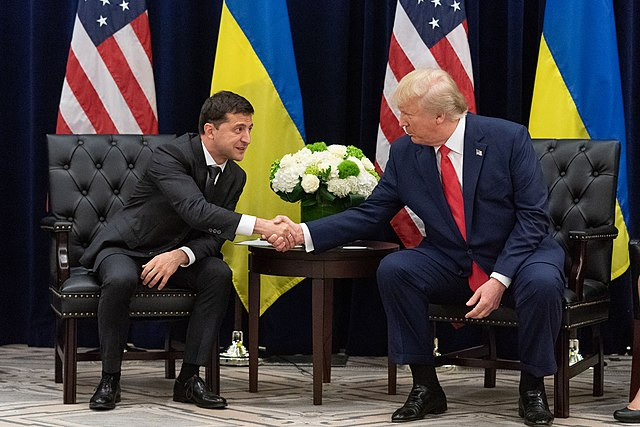In his first major interview since returning to the White House, President Donald Trump sparked controversy with remarks criticizing Ukrainian President Volodymyr Zelensky and suggesting Ukraine should not have resisted Russia's invasion. Trump, who has pledged to broker a peace deal between Russia and Ukraine, claimed that the war would never have started under his administration.
"Zelensky was fighting a much bigger entity, much bigger, much more powerful," Trump told Fox News' Sean Hannity. "He shouldn't have done that, because we could have made a deal." The president's comments quickly drew backlash, with critics questioning his grasp of the conflict and its implications for U.S. foreign policy.
Trump, who has long criticized the Biden administration's approach to Ukraine, claimed Zelensky's decision to resist Moscow's aggression was a mistake. "I could have made that deal so easily, and Zelensky decided that 'I want to fight,'" Trump said. He highlighted Ukraine's military disadvantages, noting Russia's superior number of tanks and other resources, and argued that a negotiated settlement could have avoided the bloodshed.
The remarks mark a sharp departure from the Biden administration's stance, which included robust military aid to Ukraine and sanctions on Russia following its February 2022 invasion. Biden repeatedly emphasized U.S. support for Zelensky's leadership and Ukraine's sovereignty, aligning with NATO allies to counter Russian aggression.
Critics were quick to condemn Trump's comments. Jim Sciutto, CNN's chief national security analyst, questioned Trump's approach, asking on X, formerly Twitter, "Would he have said the same of Poland in 1939?" Meanwhile, Dionis Cenusa, a fellow at the Center for European Policy Analysis, warned that Trump's perspective could embolden Moscow. "Trump reduces the war to the period from February 2024 to today. This misinterpreted or ignored causality behind the Russian war against Ukraine could play into Moscow's hands during peace talks," Cenusa wrote.
In the interview, Trump also turned his criticism toward Russian President Vladimir Putin, blaming him for the conflict and stating that Russia has lost approximately 850,000 soldiers. "Putin shouldn't have done it... and it has to stop," Trump said, adding that the U.S. would impose "massive tariffs and massive taxes" on Russia if Putin does not agree to a peace deal soon.
Despite his criticisms of both leaders, Trump has expressed willingness to meet with Zelensky and Putin in the coming weeks to push for a negotiated settlement. "Let's get this war, which never would have started if I were President, over with! We can do it the easy way, or the hard way," Trump wrote on Truth Social.
The president also claimed his energy policies would have prevented the conflict. "Biden did a horrible, horrible job in allowing that war to start. It should never have started," Trump said. "He allowed energy to go way up. If he brought it down, the war wouldn't have started."
While Trump declared that the war could be ended "within one day" under his leadership, analysts remain skeptical. The ongoing conflict has already claimed hundreds of thousands of lives and devastated Ukraine's infrastructure.
In September, Trump met with Zelensky, vowing to pursue a deal that would satisfy both parties. "We're going to work very much with both parties to try and get this settled and get it worked out," Trump told reporters at the time. However, his latest remarks labeling Zelensky "no angel" have raised questions about the feasibility of Trump positioning himself as a neutral mediator.
Trump's comments underscore a significant shift in tone from the Biden administration's unwavering support for Ukraine. Critics argue that Trump's approach risks alienating allies and undermining Ukraine's position in peace negotiations.
Putin, for his part, has expressed a willingness to engage in talks but has emphasized addressing what he calls the "root causes" of the conflict. Analysts warn that Trump's framing of the war and his apparent downplaying of Ukraine's resistance could embolden Russia's negotiating position.




